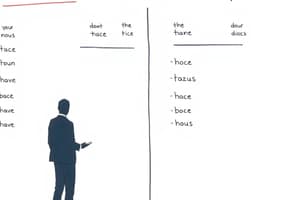Podcast
Questions and Answers
Which of the following is an example of a possessive pronoun?
Which of the following is an example of a possessive pronoun?
- jump
- that
- hers (correct)
- everyone
A reflexive pronoun can stand alone without a noun or pronoun to reference.
A reflexive pronoun can stand alone without a noun or pronoun to reference.
False (B)
What is the function of an interrogative pronoun?
What is the function of an interrogative pronoun?
To ask a question.
The word '_________' is an example of a demonstrative pronoun.
The word '_________' is an example of a demonstrative pronoun.
Which of the following is an example of a proper noun?
Which of the following is an example of a proper noun?
Match the following pronouns to their descriptions:
Match the following pronouns to their descriptions:
A common noun can be capitalized.
A common noun can be capitalized.
What type of noun cannot be perceived with the five senses?
What type of noun cannot be perceived with the five senses?
Which of the following sentences contains a linking verb?
Which of the following sentences contains a linking verb?
Auxiliary verbs can change their forms based on the subject of the sentence.
Auxiliary verbs can change their forms based on the subject of the sentence.
An example of a ______ noun is 'team'.
An example of a ______ noun is 'team'.
Identify the action verb in the following sentence: 'The squirrel gathered food at the campsite.'
Identify the action verb in the following sentence: 'The squirrel gathered food at the campsite.'
Which of the following is an example of a noncount noun?
Which of the following is an example of a noncount noun?
Match the type of pronoun with its description:
Match the type of pronoun with its description:
Concrete nouns can be experienced with one or more of the five senses.
Concrete nouns can be experienced with one or more of the five senses.
What do we call the word that a pronoun replaces?
What do we call the word that a pronoun replaces?
Flashcards are hidden until you start studying
Study Notes
Nouns
- Nouns are classified into several categories: common, proper, abstract, concrete, compound, collective, count, and non-count.
- Common nouns refer to any general person, place, thing, or idea and are not capitalized (e.g., firefighter, town, book).
- Proper nouns specify particular people, places, or things and are always capitalized (e.g., Chief Wilson, Kansas City, Where the Red Fern Grows).
- Abstract nouns represent intangible ideas or qualities that cannot be experienced through the senses (e.g., love, courage, knowledge).
- Concrete nouns can be perceived through the senses (e.g., lightning, thunder, ice cream).
- Compound nouns consist of two or more words combined to form a single noun, which can be in closed, hyphenated, or open form.
- Collective nouns indicate groups of people or things (e.g., family, group, majority, team, class).
- Count nouns can be quantified and pluralized (e.g., cake/cakes, pig/pigs).
- Non-count nouns exist only in singular form and cannot be pluralized (e.g., music, advice, rice).
Pronouns
- Pronouns replace nouns in sentences and include types such as personal, possessive, indefinite, relative, reflexive, intensive, demonstrative, and interrogative.
- An antecedent is the original noun that a pronoun refers to or replaces (e.g., "Sara studied for the test, and she got an A").
- Personal pronouns are used for specific individuals or things (e.g., he, she, it, them).
- Possessive pronouns indicate ownership and have no apostrophes (e.g., mine, yours, his, theirs).
- Indefinite pronouns refer to unspecified people or things (e.g., few, everyone, someone).
- Relative pronouns connect clauses or phrases to nouns (e.g., who, whom, which, that).
- Reflexive pronouns reflect the action back on the subject (e.g., myself, themselves).
- Intensive pronouns emphasize another noun or pronoun (e.g., myself, himself).
- Demonstrative pronouns highlight specific nouns (e.g., this, those).
- Interrogative pronouns are used to pose questions (e.g., who, what, which).
Verbs
- Verbs express actions, occurrences, or states of being and are essential components of sentences.
- Types of verbs include action verbs, linking verbs, auxiliary verbs, and irregular verbs.
- Action verbs convey physical or mental actions performed by the subject (e.g., run, jump, bake).
- Linking verbs connect the subject to further information without showing action (e.g., be, become, seem).
- Auxiliary verbs assist main verbs in expressing tense, mood, or voice (e.g., am, is, has).
- Modal auxiliary verbs remain unchanged and modify the main verb (e.g., can, may, will).
- Recognizing actions with auxiliary verbs enhances sentence comprehension (e.g., "Does she have a goldfish?" - "have" is auxiliary).
Studying That Suits You
Use AI to generate personalized quizzes and flashcards to suit your learning preferences.




